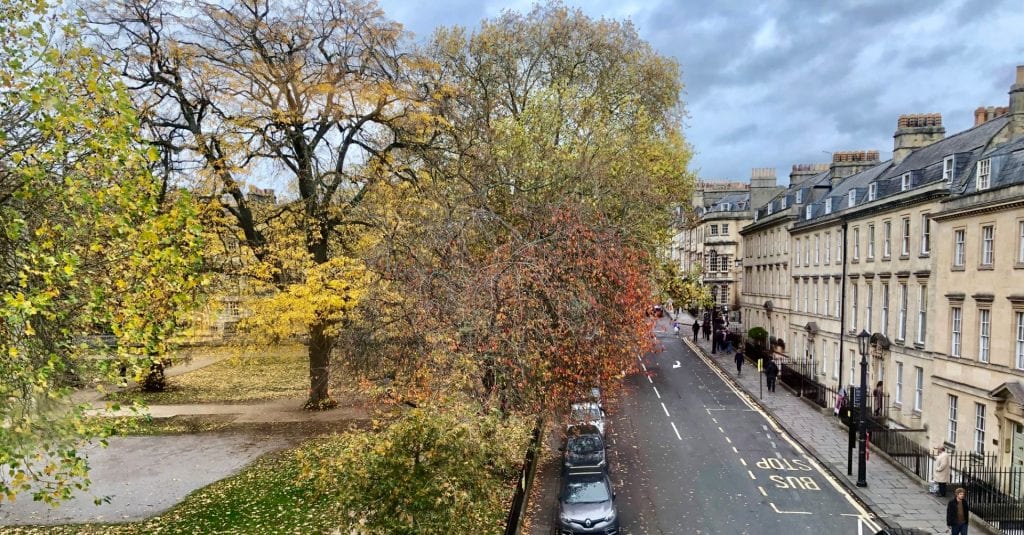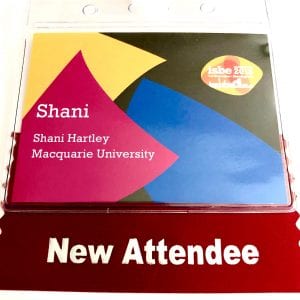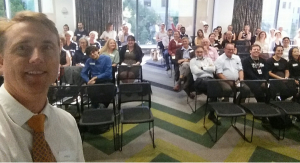I was recently challenged by someone to add more of my own thinking to this blog, given that recently it has been more about other people’s voices. So sitting in my gorgeous hotel in Bath, occasionally looking out the window (view in image above) for moments of contemplation, I have bashed out where my head is currently at re education and my PhD. By the way, for my more general thoughts, less education related, I have a writing blog too. Often the lines blur so the decision as to where to post can be quite the quandary.
So here goes.
I am passionate and quite emotionally tied up with:
- Students’ gaining agency through education so they feel empowered to make choices and decisions about their own lives and believe they can have an impact on the people, communities and societies around them.
- Creating a broad curriculum that students value and engage in.
- Implementing pedagogy that enables students to value and engage with the curriculum.
- This generally means the curriculum needs to be relevant to real life in terms of what is being learnt, how it is learnt and how it is assessed.
- Also means that there is a need to not only focus on students’ attainment on knowledge but also their development of skills, attributes, competencies, capabilities, and other closely related terms.
- Breaking down the restrictions, barriers and the risk levels teachers feel, to enable students to learn and acquire the knowledge, skills and attributes they need now and into the future.
Thus, there are several areas in education that really make me angry and frustrated.
- Teachers who just want to deliver information to compliant students.
- People outside the profession who think education is merely about delivering information to compliant students.
- The lack of recognition that to do more than deliver information takes time and energy.
- The teachers who think their innovative teaching method is the one and only way. Teaching needs to be fit for purpose.
- Schools that promote themselves as being a “PBL school” or some other particular method of learning annoys the hell out of me. Teaching needs to be fit for purpose.
- Students and their families who focus on the final grade at the end of over a decade of education and not appreciating learning for its own sake. This is exemplified by students who say “just tell me what I need to know”.
- Schools and teachers who cater to students and families’ single-minded focus on grades and/or want to maintain an outdated image of compliant students sitting in rows, working in silence.
- The confines of prescribed curriculum reducing teaching to a tick-box approach to covering material.
- Curriculum that claims in overarching statements at the front of documents that they are achieving a range of knowledge, skills and attributes through that curriculum and then in the back end, reduce teaching to be mainly about the mere delivery of knowledge.
- Dichotomies in education that reduce concepts to either/or concepts. I am sometimes guilty of buying into some of them in my research and writing. I am particular against the ideas of traditional versus progressive teaching and knowledge versus skills and attributes. Again, it’s about teaching that is fit for purpose. Fit for the knowledge, skills and attributes being sought, fit for the students undertaking the learning and fit for the context and available resources.
- The terms “non-cognitive skills” and “soft skills”, as if leadership, creativity, interpersonal skills and so on, do not require thinking and hard work to develop and improve.
- The term “21st century skills”, as if these skills have only been needed for the last 18 years and not before. How ridiculous!
- Socio-economic inequities in education. I have worked in four private schools with various level of fees and funds to expend. My own children went to private schools for the most part. Despite my own actions and behaviour, I desperately want public schools to be better resourced. Technology adds to the socio-economic gap in education and yet I am still an advocate for technology in teaching because it is such an integral part of our lives. I worry how much education adds to income inequality in our society.
- Other inequities in education that occur on the basis of gender, race, learning difficulties and much more.
- STEM (Science, Technology, Engineering and Mathematics) currently being valued so much more than the Humanities. Is it really to cater for a job market (and thereby treating education as the mere creation of human capital)? Or is it about reducing the amount of critical thinking about societies, communities and the people within them?
- The treatment of education as if it is about producing human capital. I will acknowledge there is an element of that occurring because it is inescapable in a capitalist society but there is so much more to education than this!
This thinking informs the research I want to undertake for my PhD. It has led me to Enterprise Education which has the potential to encompass all that I desire in education. I also resist the wholesale embracing of capitalism and therefore would prefer if Enterprise Education did not overly feature entrepreneurship and financial gains. To me, Enterprise Education is about developing students’ enterprising skills and attributes in the broadest sense, allowing all students to flourish. I want to discover the best objectives, curriculum, pedagogies and assessment processes in Enterprise Education that is conducted at a scale beyond the classroom, at a whole grade level, preferably more than a one-off experience but a whole year program. I would love to just submerge myself in a few of these programs and analyse what works best.
Attending the ISBE Conference last week was a fantastic immersive experience in the thinking of a whole bunch of amazing people working in this area but it also added to the imposter syndrome monster within me. My struggle is the more academic aspect of doing what I want to do. I need to work out theoretical approaches/lenses and frameworks. This is what keeps me awake at night and occasionally drives me to tears. Am I ever going to get my head around this stuff? Am I ever going to be able to produce good quality academic work that can make a difference in education by influencing curriculum and helping teachers to happily do the best for their students? Well, that’s my dream. I’m sure once I have a grip on the academic theories I will be able to analyse and write and have a voice in the arena but right now there’s a huge wall in front of me. I have ten days to write a decent PhD proposal, including a literature review, while I also enjoy the pleasures of being a tourist as I finish up in Bath, go to Prague, and then head home. I know, tough life and all. I will submit a proposal at the end of this time but it won’t be anywhere near the quality I desire unless an epiphany occurs.
Soon this initial hurdle will be behind me and I won’t have to think on it until the PhD truly commences in 2019. In the meantime, back home, I’ll be preparing for Christmas and finding somewhere new to live (long story). I am looking forward to hosting a party for my fellow post-grad education researchers, visiting family in Adelaide, going to the cricket and tennis, reading for pleasure and experiencing the glorious heat and sun of summer in Sydney, Australia.
PS My playlist (shuffled) as I wrote this post.









